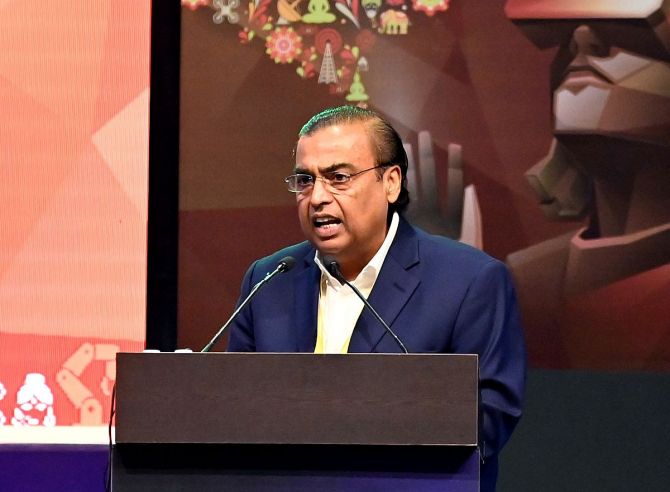Reliance Industries Ltd, India's most valuable company, on Friday reported a 5 per cent drop in its June quarter net profit as lower fuel cracks and petrochemical margins outdid gains in telecom and retail businesses.

The oil-to-retail-to-telecom conglomerate's consolidated net profit was at Rs 15,138 crore, or Rs 22.37 per share, in April-June -- the first quarter of the current 2023-24 fiscal year -- compared to Rs 16,011 crore, or Rs 23.66 a share, earnings a year back, according to a company's statement.
The net profit was also 20 per cent lower quarter-on-quarter when compared to the record Rs 18,951 crore earnings in the preceding three months ended March 31.
Besides lower transportation fuel cracks or margins, particularly that of petrol which was down 30 pre cent, and reduced chemical margins, Reliance also had a higher outgo on depreciation cost, hurting profitability.
The firm helmed by billionaire Mukesh Ambani continued to post an uptick in consumer businesses of retail and telecom.
While Jio pole-vaulted to becoming the largest telecom operator globally in terms of data tariff as 5G propelled usage, the retail business delivered steady performance due to increase in footfalls at its expanded store network.
Depreciation/amortisation expenses were up 15.5 per cent to Rs 13,596 crore due to expanded asset base across all businesses, while there was also a marginal rise in finance cost.
Operationally, the company posted a 2 per cent growth in EBITDA or earnings before tax, at Rs 42,748 crore.
Revenue from operations were up 11.5 per cent to Rs 2.57 lakh crore from Rs 2.31 lakh crore in the year-ago period but were lower than Rs 2.64 lakh crore in January-March 2024.
The mainstay oil refining and petrochemicals business, called O2C, posted a 14.3 per cent fall in EBITDA to Rs 13,093 crore.
This was "due to lower transportation fuel cracks, particularly gasoline (petrol) cracks which was down 30 per cent year-on-year.
"Downstream chemical margins were also lower on y-o-y basis", the statement said.
Muted Chinese demand with increase in EV penetration was responsible for the fall in cracks -- the differential between a barrel of crude oil (raw material) and the petroleum products refined from it.
With the consumer base swelling to 489.7 million from 481.8 million at the end of March and per user revenue (ARPU) rising to Rs 181.7 from Rs 180.5, Reliance Jio Infocomm Ltd -- the digital services business -- posted a 11.7 per cent rise in net profit to Rs 5,698 crore in Q1.
Also aiding the business was consumers migrating to its latest offering 5G services and cricket world cup.
Per capita data consumption increased to 30.3 GB per month or more than 1 GB a day.
"Jio has become the largest operator globally in terms of data traffic," it said, adding in terms of subscribers, Jio is the largest 5G operator outside of China.
Profits from retail business climbed 4.6 per cent to Rs 2,549 crore as store count rose to 18,918 from 18,836 as on March 31.
Store footfalls were up nearly 19 per cent to 296 million.
Oil and gas EBITDA soared 30 per cent to Rs 5,210 crore as higher volumes of gas production offset lower price realisation.
The average gas production from eastern offshore KG-D6 block was 28.7 million standard cubic metres per day (up from 27 mmscmd last year).
The company said its net debt stood at Rs 1.12 lakh crore, down from Rs 1.16 lakh crore as on March 31.
Commenting on the results, Mukesh D. Ambani, chairman and managing director, Reliance Industries Limited, said: "Consolidated EBITDA for the quarter improved from a year ago with strong contribution from consumer and upstream (oil and gas) businesses offsetting weak O2C operating environment. Reliance's resilient operating and financial performance in this quarter underscores the strength of its diverse portfolio of businesses."
The digital services business, he said, registered an impressive financial performance year-on-year, continuing its positive growth momentum.
Also, retail business delivered robust financial results, as compared to last year, well supported by all consumption baskets.
With fast-paced expansion of its retail footprint, Reliance Retail continues to cement its position as the preferred retailer for millions of Indians.
The digital and new commerce segments are also scaling up rapidly.
"The deep integration and flexibility built into our O2C business model helped mitigate the impact of challenging operating environment.
"The business was impacted by lower fuel cracks with tepid global demand and ramp-up of new refineries," he said.
"The oil and gas segment continued its growth trajectory with higher production, offsetting lower year-on-year gas price realizations."
Ambani said Reliance has made significant progress on the implementation of new energy giga-factories, but gave no details.
"On completion, these projects will provide India a world-class, integrated green energy ecosystem which can propel the next leg of sustainable growth," he added.










